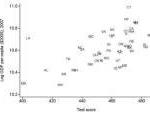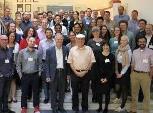
 |
| Issue 2/2016 |
Recent Research Topics |
Ifo Education Survey Shows Germans’ Willingness to ReformGermans are open to fundamental educational reforms. This is the result of the second Ifo Education Survey, a representative opinion survey of the adult population in Germany. Ten topics on which there are clear majorities in favor of change: free pre-schools, nationwide quality standards for pre-schools, abolition of the child-care subsidy, free choice of primary schools, whole-day school system, nationwide comparable tests in school, nationwide exit exams for all high-school degrees, lifting the constitutional ban on cooperation between federal and state governments in school policy, public funding of apprenticeships for failed applicants, and deferred tuition fees for higher education. more... |

|
Education Important for Income Differences across US StatesIn a recent study, Jens Ruhose and Ludger Woessmann from the Ifo Center for the Economics of Education, together with Ifo research professor Eric Hanushek from Stanford University, examine whether the significant differences in per-capita GDP that exist across US states are related to the education of the population. They develop detailed measures of the human capital of the population of the US states that reflect not only the quantity of education but also its quality as measured in test performance. They find that 20 to 35 percent of the income differences across US states can be attributed to differences in the human capital of the population. more... |

|
Central School Exams Have Information Value on the Labor MarketIf the grade on your German high-school leaving exam is one level higher, your later earnings on the labor market are 3 percent higher than for comparable graduates if you took your exam in a state without central exams. But if you took your exam in a state with central exams, this relationship is 6 to 7 percentage points stronger. This is what a recent study by Ludger Woessmann and Ifo research professor Guido Schwerdt from the University of Konstanz finds. That is, central exit exams have a higher information value for earnings and thus a better signaling property for later productivity in the labor market. more... |

|
How Business-Cycle Conditions Affect Teacher QualityHow do alternative job opportunities affect teacher quality? To investigate this, Marc Piopiunik from the Ifo Center for the Economics of Education, Ifo research professor Martin West from Harvard University and Markus Nagler from the University of Munich examine business-cycle conditions at career start in detailed micro data from Florida. They find that teachers who enter the profession during a recession are significantly more effective in raising student test scores. more... |

|
Ph.D. Thesis on Economic Consequences of MigrationAgainst the background of a steadily increasing proportion of migrants in the total population, Jens Ruhose’s Ph.D. thesis, written at the Ifo Center for the Economics of Education and accepted at the Ludwig-Maximilians-University of Munich, investigates the integration of immigrants and the impact of migration on the local population in the target country. After quantifying the non-monetary costs of migration that result from overcoming cultural barriers, he examines whether early tracking of students into different types of school inhibits the integration of migrant children. He then shows that growing up in cities with a large migrant population increases intergenerational income mobility. more... |

|
Railroads as a Growth Engine in PrussiaInnovative technologies can spur long-term growth: Prussian cities that got connected to the emerging railroad network in the 19th century grew significantly faster than comparable cities without railroad access. This is demonstrated in a paper by Erik Hornung, recently published in the Journal of the European Economic Association and based on the Ph.D. thesis he wrote at the Ifo Center for the Economics of Education. For the analysis, he matched data for roughly 1,000 towns from 1840 to 1871 with maps of the development of the German railway network and developed microeconometric methods for the identification of causal effects. more... |

|
Ph.D. Thesis on Information and Communication TechnologiesWhile working at the Ifo Center for the Economics of Education, Nadine Fabritz wrote her Ph.D. thesis on the determinants and economic implications of investments in information and communication technologies (ICT), which was accepted as a dissertation by the Ludwig-Maximilians-University of Munich. Using microeconometric methods, she examines how ICT investments affect the innovation activities of enterprises and how broadband infrastructure affects employment and sales at the company level and employment at the municipal level. She also analyzes how local deregulation of the broadband market affects market entry and investments. more... |

|
| Back to top | |
A European Perspective: EENEE | |
|
The European Expert Network on the Economics of Education (EENEE) – coordinated by the Ifo Center for the Economics of Education on behalf of the European Commission – published an EENEE Analytical Report on school size and school consolidations: Maria Knoth Humlum and Nina Smith: The Impact of School Size and School Consolidations on Quality and Equity in Education, EENEE Analytical Report 24 |

|
|
There are also two recent EENEE Policy Briefs – two-page presentations that cast a spotlight on important research results in the debate on key policy issues: 3/2015: Francis Kramarz and Martina Viarengo: The Role of Education in Preventing and Combating Youth Unemployment (based on EENEE Analytical Report 22) 4/2015: Torberg Falch and Daniel Münich: Policies to Attract a High-Quality and Innovative Teaching Force (based on EENEE Analytical Report 23 by Torberg Falch and Constantin Mang) | |
| Back to top | |
In the English News |
Teach the WorldIn an article for Foreign Affairs, Eric Hanushek and Ludger Woessmann explain why the UN Sustainable Development Goals should focus on education. more... |
The Best Way to Boost GDP: Education?U.S. News reports on the article “The Economic Case for Education” by Ludger Woessmann. more... |
In the German News |
Ifo Education Survey: No Sign of Reform WearinessRadio and television, the press and the Internet cover the results of the Ifo Education Survey in detail: from ZDF heute to Deutschlandfunk, from Spiegel online and Zeit online to FAZ, SZ, Welt, and Handelsblatt. more... |
New Migrants Compete with Previous MigrantsInterview with Jens Ruhose in the online edition of Die Welt on how Germans benefit from migrants. more... |
Why Tuition Fees in Higher Education Are FairInterview in Die Zeit with Ludger Woessmann on deferred tuition fees, for which there is a clear majority in the Ifo Education Survey. more... |
Without Incentives it Hardly WorksInterview with Ludger Woessmann in the Neue Zürcher Zeitung on the meaning of the return to education and how it works. more... |
The Knowledge Capital of NationsThe Neue Zürcher Zeitung reviews the new book “The Knowledge Capital of Nations” by Eric Hanushek and Ludger Woessmann. more... |
Think of the Future! Re-introduce Tuition FeesIn an interview in the German edition of the Huffington Post, Ludger Woessmann argues for the introduction of deferred tuition fees. more... |
The Revolution Will not Take PlaceDie Zeit reports on the study by Oliver Falck, Constantin Mang, and Ludger Woessmann on the use of computers in schools. more... |
| Back to top |
Selected Events | |
CESifo Area Conference on the Economics of EducationOn 11 and 12 September 2015, leading international education economists gathered for the 7th time at the Ifo Institute for the CESifo Area Conference on the Economics of Education, organized by Eric Hanushek, Stanford, and Ludger Woessmann, to discuss results at the cutting edge of their research. The Jacobs Foundation Lecture was delivered by Richard Freeman, Harvard. more... |

|
| Back to top | |
Recent Publications |
MonographsNadine Fabritz, Investment in ICT: Determinants and Economic Implications, ifo Beiträge zur Wirtschaftsforschung 60, Munich: Ifo Institute, 2015.Jens Ruhose, Microeconometric Analyses on Economic Consequences of Selective Migration, ifo Beiträge zur Wirtschaftsforschung 61, Munich: Ifo Institute, 2015. |
Articles in Refereed JournalsErik Hornung, “Railroads and Growth in Prussia”, Journal of the European Economic Association 13 (4): 699-736, 2015. |
Working PapersEric A. Hanushek, Jens Ruhose, and Ludger Woessmann, “Human Capital Quality and Aggregate Income Differences: Development Accounting for U.S. States”, NBER Working Paper 21295 and CESifo Working Paper 5411, June 2015.Tim Krieger, Laura Renner, and Jens Ruhose, “Genetic Distance and International Migrant Selection”, CESifo Working Paper 5453, July 2015. Markus Nagler, Marc Piopiunik, and Martin R. West, “Weak Markets, Strong Teachers: Recession at Career Start and Teacher Effectiveness”, NBER Working Paper 21393 and CESifo Working Paper 5454, July 2015. Guido Schwerdt and Ludger Woessmann, “The Information Value of Central School Exams”, CESifo Working Paper 5404, June 2015. |
| Back to top |
Imprint | |
|
The Newsletter of the Ifo Center for the Economics of Education is a free e-mail service which informs about new research results, publications, events, and more from the Ifo Center for the Economics of Education. You can download previous issues of the newsletter in the archive. Subscribe | Unsubscribe | Feedback Your data will be stored internally by CESifo Group for dispatch of the Newsletter of the Ifo Center for the Economics of Education. It will be treated confidentially and will not be handed on to third parties. For more information see Privacy Policy. You can also visit the website of the Ifo Center for the Economics of Education. Or send us an e-mail at bildungsnews@ifo.de. Copyright © Ifo Institute 2016. Status: May 2016 Editor: Ifo Center for the Economics of Education, Ifo Institute – Leibniz Institute for Economic Research at the University of Munich, Poschingerstrasse 5, 81679 Munich
| |